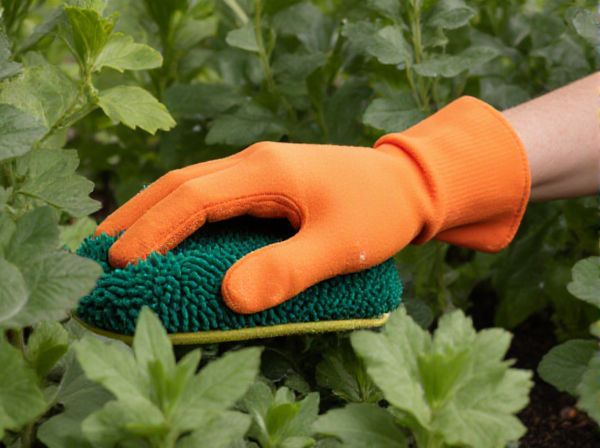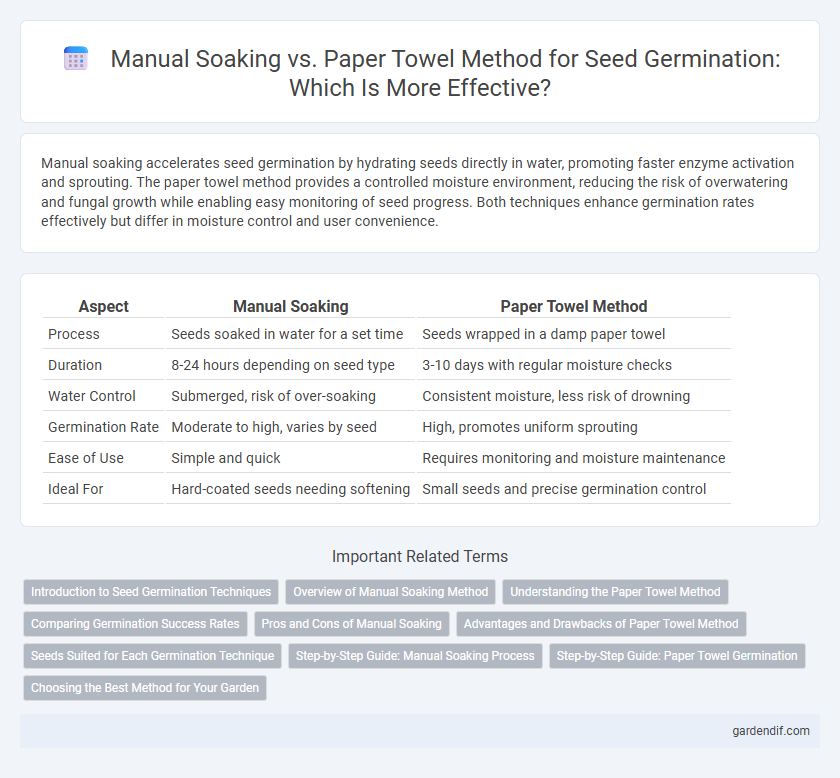
Manual Soaking vs Paper Towel Method Illustration
Manual soaking accelerates seed germination by hydrating seeds directly in water, promoting faster enzyme activation and sprouting. The paper towel method provides a controlled moisture environment, reducing the risk of overwatering and fungal growth while enabling easy monitoring of seed progress. Both techniques enhance germination rates effectively but differ in moisture control and user convenience.
Table of Comparison
| Aspect | Manual Soaking | Paper Towel Method |
|---|---|---|
| Process | Seeds soaked in water for a set time | Seeds wrapped in a damp paper towel |
| Duration | 8-24 hours depending on seed type | 3-10 days with regular moisture checks |
| Water Control | Submerged, risk of over-soaking | Consistent moisture, less risk of drowning |
| Germination Rate | Moderate to high, varies by seed | High, promotes uniform sprouting |
| Ease of Use | Simple and quick | Requires monitoring and moisture maintenance |
| Ideal For | Hard-coated seeds needing softening | Small seeds and precise germination control |
Introduction to Seed Germination Techniques
Manual soaking involves immersing seeds in water for a specific period to soften the seed coat and accelerate germination by activating enzymes and breaking dormancy. The paper towel method places seeds between moist paper towels, providing a controlled, consistent moisture environment that enhances seed-to-soil contact and promotes rapid sprout emergence. Both techniques optimize germination rates by improving water absorption, but the choice depends on seed type, size, and environmental conditions.
Overview of Manual Soaking Method
The manual soaking method in germination involves immersing seeds in water for a specific duration, typically 12 to 24 hours, to soften the seed coat and accelerate the sprouting process. This technique improves water absorption, promotes faster enzyme activation, and enhances seed viability, especially for larger or harder seeds like beans and peas. Proper timing and temperature control during soaking optimize germination rates and reduce the risk of seed rot.
Understanding the Paper Towel Method
The paper towel method involves placing seeds between moist paper towels to create a controlled environment that maintains consistent moisture levels essential for germination. This technique enhances air circulation around the seeds, preventing mold growth while allowing easy monitoring of sprout development. It offers a precise, efficient alternative to manual soaking by reducing waterlogging risks and promoting uniform seed hydration.
Comparing Germination Success Rates
Manual soaking typically yields faster germination by allowing seeds to absorb water directly, resulting in success rates around 80-90% for many species. The paper towel method provides a controlled moisture environment that promotes consistent germination rates, often reaching above 85%, with reduced risk of seed rot. Comparing both, manual soaking accelerates initial root emergence, whereas paper towels offer more uniform germination success, especially for sensitive seeds.
Pros and Cons of Manual Soaking
Manual soaking enhances seed hydration by allowing precise control over water temperature and duration, promoting uniform germination rates. However, it requires constant monitoring to prevent seed rot or oxygen deprivation, which can hinder sprouting. This method is less space-efficient and can be labor-intensive compared to the paper towel technique, limiting scalability for large seed batches.
Advantages and Drawbacks of Paper Towel Method
The paper towel method for seed germination offers precise moisture control and easy monitoring of seed progress, reducing risks of overwatering and fungal growth commonly associated with manual soaking. This technique also allows for uniform germination conditions and quicker identification of viable seeds, enhancing overall success rates. However, drawbacks include the potential for drying out if not properly maintained and limited scalability compared to soil-based methods, making it less suitable for large-scale planting.
Seeds Suited for Each Germination Technique
Seeds with hard coats like beans, peas, and corn benefit from manual soaking, which softens the outer layer and accelerates germination by allowing water to penetrate more easily. Delicate seeds such as lettuce, petunia, and tomato respond better to the paper towel method, where consistent moisture and air circulation promote even sprouting without the risk of oversaturation. Selecting the appropriate technique based on seed type optimizes germination rates and improves seedling health.
Step-by-Step Guide: Manual Soaking Process
Start the manual soaking process by selecting high-quality seeds and placing them in a clean container filled with lukewarm water. Soak the seeds for 8 to 12 hours, ensuring they remain fully submerged but not overcrowded to allow optimal water absorption. After soaking, drain the seeds thoroughly and transfer them to a suitable germination medium, maintaining consistent moisture and temperature for effective sprouting.
Step-by-Step Guide: Paper Towel Germination
To germinate seeds using the paper towel method, moisten a clean paper towel and spread seeds evenly across its surface, ensuring they are not touching. Fold the towel over the seeds and place it inside a resealable plastic bag to maintain humidity, then store it in a warm, dark location between 70degF and 85degF. Check the seeds daily for sprouting, keeping the towel moist but not soaked, and transfer germinated seeds to soil once roots are visible.
Choosing the Best Method for Your Garden
Manual soaking enhances seed hydration by immersing seeds directly in water, promoting quicker germination for larger, tougher seeds. The paper towel method provides controlled moisture and air exposure, ideal for monitoring germination progress and detecting seed viability, especially for smaller or delicate seeds. Selecting the best method depends on seed type, desired germination speed, and monitoring needs to optimize garden results.
Manual Soaking vs Paper Towel Method Infographic

 gardendif.com
gardendif.com